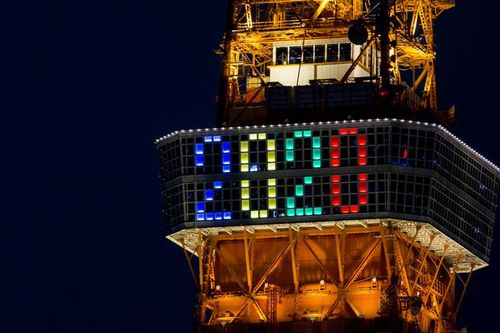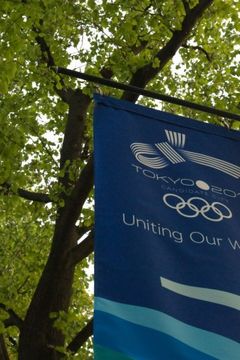July 19, 2016
Aiming for Sustainable Tokyo Olympic, Paralympic Games
Keywords: Newsletter Others
JFS Newsletter No.166 (June 2016)

Image by t-mizo Some Rights Reserved.
Tokyo 2020 Olympics, Paralympics
Tokyo will be hosting the 2020 Olympic and Paralympic Games. This will be the second Olympics held in Tokyo, following the 1964 Games 56 years prior. As with the 1964 Olympics, many people are eagerly awaiting the event in Japan. Tokyo 2020, however, will focus on a new aspect to which the 1964 Games paid little attention -- "sustainability."
Regardless of where they are held, the Olympic Games are sports festivals, but their impact on the Earth varies greatly depending on how host cities consider, prepare for and run the Olympics.
Previously, when global environmental issues were not yet a major social concern, the Olympic Games were not connected with environmental consciousness or sustainability. With concern growing over global warming and other environmental issues, though, more and more people have been taking a serious look at the ways the Olympics are delivered because of their scale and magnitude of influence.
London 2012 was the first Olympic Games to create a clear vision of "sustainable Olympics." Aiming for the most sustainable Olympic Games of modern times, London adopted the concept of "One Planet Olympics." To this end, in 2007 the city established the Commission for a Sustainable London 2012, an independent body which monitored and assured the sustainability of the London 2012 Olympic and Paralympic Games. It was the first time such a commission was established in Olympic history.
For the Olympic and Paralympic Games which have a large impact on the environment, a critical factor is to have sustainability standards not only for the activities during the event but also for the preparation and construction of the venues and procurement of various materials. London 2012 produced a set of strict and comprehensive standards for procurement, called the LOCOG Sustainable Sourcing Code, so that environmentally sound and socially responsible products and services would be used. For example, wood used in constructing the venues and paper products were required to be certified by the Forest Stewardship Council (FSC), and foods and drinks served at the venues and Olympic Village needed to be certified as fair trade, organically grown or sustainably produced.
So, what will the Tokyo 2020 Olympics and Paralympics be like? Tokyo is certainly expected to go beyond the ambitious vision and results of London 2012.
'Urban Planning and Sustainability Commission' Established by Tokyo 2020 Organising Committee
The Tokyo 2020 Organising Committee includes five experts' commissions, covering athletes, urban planning and sustainability, culture and education, economy and technology, and the media. The author is a member of the Urban Planning and Sustainability Commission.
https://tokyo2020.jp/en/organising-committee/structure/
The Organising Committee's website contains a page on "Sustainability":
https://tokyo2020.jp/en/games/sustainability/The Olympic and Paralympic Games are the world's largest sports events, and the delivery of the Games has a much wider-ranging impact than most people can imagine. This impact is not limited to sports, but also affects society, the economy and the environment. We aim to ensure that the influence of the Tokyo 2020 Games will extend far beyond Tokyo, the host city, to encompass the whole of Japan and the wider world. Given the growing global focus on sustainability, it is vital that these concerns be fully addressed in preparing for the delivery of the Olympic and Paralympic Games by implementing the Tokyo 2020 Sustainability Plan.
The site provides the Tokyo 2020 High-level Sustainability Plan to outline the basic approach being taken for ensuring sustainability of the games' operations. It also presents the overall direction and issues under discussion so readers can examine specific details of the plan.
Tokyo 2020 Olympic and Paralympic Games High-level Sustainability Plan
https://tokyo2020.jp/en/games/sustainability/data/sus-plan-EN.pdf
Toward Establishing a Sustainability-oriented Sourcing Code
Delivery is an essential key to Tokyo 2020. For ensuring the sustainable sourcing of products and services deemed vital to the successful delivery of the Tokyo 2020 Games, and in consideration of economic rationality, fairness and equity, the Tokyo 2020 Fundamental Principles for the Sustainable Sourcing Code provide the foundation for the code and serve as a guide for the establishment of specific contents to be included in the sourcing code.
Tokyo 2020 Olympic and Paralympic Games Fundamental Principles for the Sustainable Sourcing Code
https://tokyo2020.jp/en/games/sustainability/data/sus-principles-EN.pdf
As mentioned above, the sourcing code will have significant effects on not only Tokyo 2020's environmental load but also Japanese companies' future environment-friendliness.
As of this time, only four basic principles for sustainable sourcing are shown:
Four Principles
Tokyo 2020 places the utmost importance on:
- how products and services are supplied.
- the origins of products and services and the resources from which they are made.
- compliance to the sourcing code throughout the supply chains.
- the effective use of resources.
From now on, details of the sourcing code will be set for each item procured. Will the code set a higher level of standards for environmental measures such as those against global warming, including energy saving and the use of renewable energy? Will the code give full consideration to environmental and social aspects of developing countries, for example, in the case of wood procurement? I hope that a strict sourcing code will be established.
A preliminary draft of the Sustainable Sourcing Code is being prepared by the Sustainability Discussion Group under the Urban Planning and Sustainability Commission. Though I haven't participated in their discussion because I am not a member of that group, I will continue to watch carefully how the discussion evolves.
I am one of five members of the Low Carbon Working Group, who are considering from various viewpoints how to make the Tokyo 2020 games low-carbon. The group's position is as follows.
"There is an international trend represented by the Fifth Assessment Report of the Intergovernmental Panel on Climate Change (IPCC) published in November 2014 and the adoption of the Paris Agreement at the 21st Conference of the Parties of the United Nations Framework on Climate Change (COP21) in December 2015. 2020 Tokyo is also required to give consideration to climate change and take steps toward a low-carbon society. The Organising Committee of the Tokyo Olympics established the Low Carbon Working Group to discuss low-carbon issues for Tokyo 2020."
Other groups apart from the committee are also addressing various issues and finding approaches to making the Tokyo 2020 games sustainable. The Japan Ethical Initiative (JEI), which I help promote, has proposed making the Tokyo 2020 games more ethical by giving consideration to not only environmental issues but also social impacts.
JFS article: Planning for an Ethical Focus for the 2020 Olympics in Tokyo
http://www.japanfs.org/en/news/archives/news_id035059.html
The JEI compiled and published the "List of points to be considered in ethical sourcing guidelines." This should be included in the sourcing code and guidelines for realizing an ethical Olympics and Paralympics.
Future Developments in Sustainability for the 2020 Tokyo Games
The 2020 Tokyo Games should be prepared and managed without diminishing the sustainability of Japan and the world, but rather, improving it as a model project for people, organizations and city planning in the future from the perspective of sustainability, and contributing to improved Japanese and global sustainability after the games. Keep an eye on future developments regarding this issue. I will relay any new developments in the Sustainable Sourcing Code and its management as they arise.

Image by Haraochi
Written by Junko Edahiro
Related
"JFS Newsletter"
- 'Good Companies in Japan' (Article No.4): 'Eightfold Satisfaction' Management for Everyone's Happiness
- "Nai-Mono-Wa-Nai": Ama Town's Concept of Sufficiency and Message to the World
- 'Yumekaze' Wind Turbine Project Connects Metro Consumers and Regional Producers: Seikatsu Club Consumers' Co-operative
- Shaping Japan's Energy toward 2050 Participating in the Round Table for Studying Energy Situations
- 'Good Companies in Japan' (Article No.3): Seeking Ways to Develop Societal Contribution along with Core Businesses


